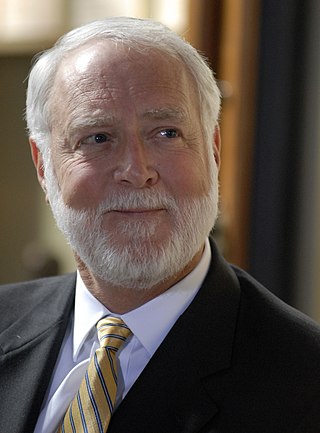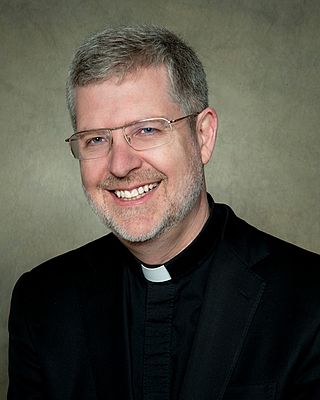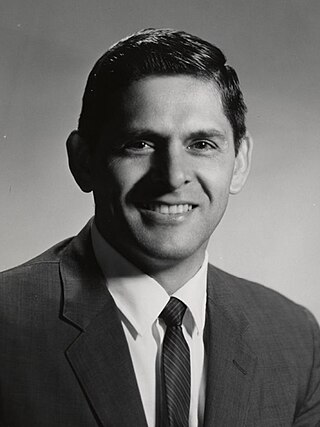Related Research Articles

Whittier College is a private liberal arts college in Whittier, California. It is a Hispanic Serving Institution (HSI) and, as of spring 2024, had 815 undergraduate and graduate students. It was founded in 1887. Whittier offers one graduate degree and a master's degree in education.

An honorary degree is an academic degree for which a university has waived all of the usual requirements. It is also known by the Latin phrases honoris causa or ad honorem . The degree is typically a doctorate or, less commonly, a master's degree, and may be awarded to someone who has no prior connection with the academic institution or no previous postsecondary education. An example of identifying a recipient of this award is as follows: Doctorate in Business Administration (Hon. Causa).

Gerald Wayne Clough is an American civil engineer and educator who is President Emeritus of the Georgia Institute of Technology and former Secretary of the Smithsonian Institution. A graduate of Georgia Tech in civil engineering, he was the first alumnus to serve as President of the Institute.

Bernard Joseph White is president emeritus of the University of Illinois and professor emeritus of business at the University of Illinois at Urbana–Champaign. He is dean emeritus of the Stephen M. Ross School of Business and professor emeritus of business administration at the University of Michigan, where he also served as interim president, and Wilbur K. Pierpont Collegiate Professor of Leadership in Management Education. He is the author of The Nature of Leadership and Boards That Excel: Candid Insights and Practical Advice for Directors. Boards That Excel was named Governance Book of the Year for 2014 by Directors and Boards.

Dennis Henry Holtschneider is president of the Association of Catholic Colleges and Universities.

Arts University Plymouth is an independent university-sector Higher Education (HE) provider located in Plymouth in South West England. The former Plymouth College of Art was officially granted university status in 2022. In April 2019 the specialist college was awarded taught degree awarding powers (TDAP) by the Quality Assurance Agency for Higher Education (QAA), granting the institution the authority to award and accredit its own BA (Hons) degrees and Masters awards.

Franklin University is a private university with its main campus in Columbus, Ohio. It was founded in 1902 to serve the needs of students beyond traditional undergraduate age. On-site courses are offered at the university's campus in Columbus' Discovery District. However, most students take courses online. The university has over 25 location centers in the Midwestern United States and a majority online population, and reports an average student age of 34 years.

Julian Nava was an American educator and diplomat. A member of the Democratic Party, Nava served as the United States Ambassador to Mexico from 1980 to 1981.
James J. Whalen was an American psychologist and educational administrator who served as president of Ithaca College from 1975 to 1997.
An online degree is an academic degree that can be earned primarily or entirely through the use of an Internet-connected computer, rather than attending college in a traditional campus setting. Improvements in technology, the increasing use of the Internet worldwide, and the need for people to have flexible school schedules while they are working have led to a proliferation of online colleges that award associate, bachelor's, master's, and doctoral degrees.
Graduate unemployment, or educated unemployment, is unemployment among people with an academic degree.
The National Student Survey is an annual survey, launched in 2005, of all final year undergraduate degree students at institutions in England, Scotland, Wales and Northern Ireland within the United Kingdom. The survey is designed to assess undergraduate students' opinions of the quality of their degree programmes, with seven different scores published including an "overall satisfaction" mark.

Robert Winton Mendenhall is an American educational technologist best known as the president from 1999 to 2016 of Western Governors University (WGU).

The education system of the Hashemite Kingdom of Jordan includes basic, secondary, and higher education and has dramatically evolved since the establishment of the state in the early 1900s. The role played by a good education system has been significant in the development of Jordan from a predominantly agrarian to an industrialized nation over time.

National College of Ireland (NCI) is a not-for-profit, state-aided third-level education institution in Dublin. It was founded in 1951 as a joint venture between the Jesuits in Ireland and Irish trade unions, and was originally named the Catholic Workers College, Dublin. It is now an independent higher education institution, offering full and part-time courses from undergraduate to postgraduate level, in the areas of business, computing, psychology and education.
Edmund Wyatt Gordon is an American psychologist and professor. Gordon was recognized as a preeminent scholar of African-American studies when he was awarded the 2011 John Hope Franklin Award from Diverse Issues in Higher Education magazine at the 93rd Annual Meeting of the American Council on Education.

Barry Allen Munitz has been a senior administrator at the University of Illinois and the University of Houston, a business executive at Maxxam, Inc., chancellor of the California State University system, and chief executive officer of the world's wealthiest art institution, the J. Paul Getty Trust. He is on the Board of Selectors of Jefferson Awards for Public Service.
Ernest LeRoy Boyer was an American educator who most notably served as Chancellor of the State University of New York, United States Commissioner of Education, and President of the Carnegie Foundation for the Advancement of Teaching. Boyer was recipient of numerous awards, including over 140 honorary doctorates.
Elinor "Ellie" Miller Greenberg was an American author educationalist and speech pathologist, an expert in the field of adult education and experiential learning, as well as a former civil rights activist. She saw access to education as a social justice issue, and spent over thirty years creating higher education programs for non-traditional students. She headed the University Without Walls program in the 1970s; created a weekend BSN program for nurses in rural Colorado; established a degree program for Colorado prison inmates and ex-offenders; and established online master's degree programs for nurses in the 1990s. She was inducted into the Colorado Women's Hall of Fame in 2010.
References
- 1 2 3 4 5 6 7 "Robert Zemsky". Penn GSE. Retrieved 2011-01-31.
- 1 2 Jessica Calefati (2009-10-06). "Education Expert Touts a Three-Year Degree". U.S. News & World Report. Retrieved 2011-01-31.
- 1 2 Jacques Steinberg (2009-08-04). "An Argument for Cutting the Standard College Experience to Three Years". The New York Times. Retrieved 2011-01-31.
- ↑ Brian Taff and Heather Grubola (2010-05-04). "College in 3 years instead of 4!". 6ABC Action News. Retrieved 2011-01-31.
- ↑ Debra Rosenberg (2009-10-17). "What's College for Anyway?". Newsweek. Retrieved 2011-01-31.
- ↑ David Glenn (2010-08-29). "The Quality Question". The Chronicle of Higher Education. Retrieved 2011-01-31.
- ↑ Theodore E. Long (2010-12-12). "Let's stop equating high tuition with a quality college education". The Patriot-News. Retrieved 2011-01-31.
- ↑ Rick Trainor (2010-01-14). "Book of the Week:Making Reform Work: The Case for Transforming American Higher Education". The Times Higher Education. Retrieved 2011-01-31.